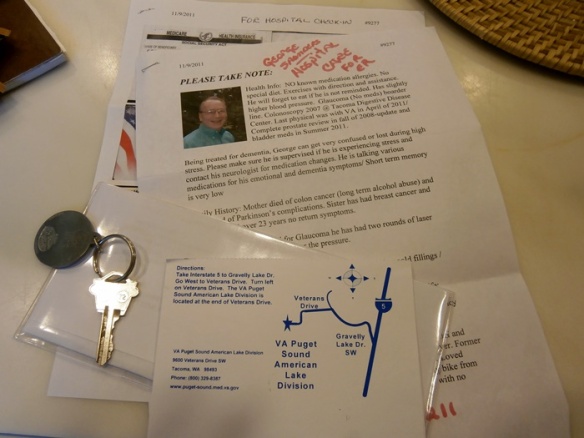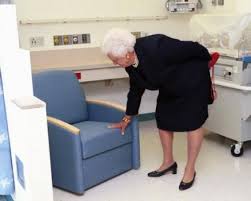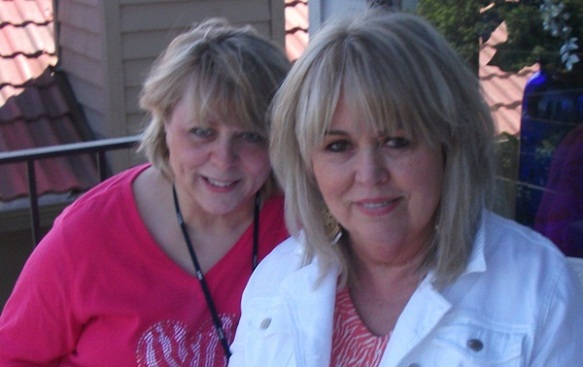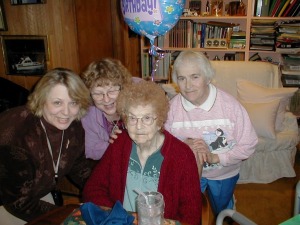How to choose hospitals that fit the needs of your senior in care. by francy Dickinson
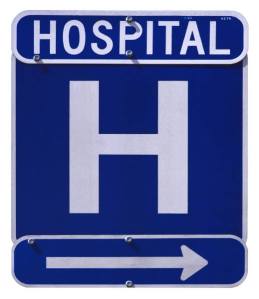 Dear Francy; We just got through with a horrible experience at our local hospital. We live in a bedroom community and my dad had been having trouble with pain in his stomach area. He had trouble going to the bathroom and his back hurt. So, we finally took him to the ER at our larger local hospital. We have two hospitals in the area; one is smaller and other is a big trauma hospital with a big ER. We went to the larger hospital thinking they would have a better ER to treat him. When we arrived the ER was packed and we had to wait and wait. Then when he was in the ER room…there was no room for him! So he was on a gurney in the outer area while a police officer was patrolling the ER. There had been gang trouble and they were trying to keep two rival gang members separated while they treated them. Poor dad, was confused, in pain and totally unable to process why the police were there. It was a nightmare. Why do they let seniors take back seats to these horrible gang people?
Dear Francy; We just got through with a horrible experience at our local hospital. We live in a bedroom community and my dad had been having trouble with pain in his stomach area. He had trouble going to the bathroom and his back hurt. So, we finally took him to the ER at our larger local hospital. We have two hospitals in the area; one is smaller and other is a big trauma hospital with a big ER. We went to the larger hospital thinking they would have a better ER to treat him. When we arrived the ER was packed and we had to wait and wait. Then when he was in the ER room…there was no room for him! So he was on a gurney in the outer area while a police officer was patrolling the ER. There had been gang trouble and they were trying to keep two rival gang members separated while they treated them. Poor dad, was confused, in pain and totally unable to process why the police were there. It was a nightmare. Why do they let seniors take back seats to these horrible gang people?
I can understand your distress and I assure you they did not take the gang members over your dad. They do Triage and the gang members were in more high risk condition, than your dad so they went first. The problem was that the hospital itself is a haven for high stress when it is a trauma center. So, lets talk about hospitals and get the idea of how to choose them in your mind. Next time when an emergency comes up…you will be prepared and be able to guide the ambulance driver to the right place for your special care.
Triage Means:
noun(in medical use) the assignment of degrees of urgency to wounds or illnesses
to decide the order of treatment of a large number of patients or casualties.
verb to assign degrees of urgency to (wounded or ill patients)
I will assume your dad had prostate or blocked bowel, correct? Those are conditions that older men have and they are very painful. Elders often do not talk about their private bathroom problems with their care givers or family…until the situation gets painful. I understand that and I’m sorry you all had to go through that sad emergency experience. But lets roll back the clock and see how it could have gone differently.
Both elder men and women need to have a verbal check each day. Care giving is part immediate and part prevention. So everyday( I usually do it while I am picking up their breakfast tray) talk to them. “Dad how was breakfast, I see you did not eat very much of your cereal. How is your stomach feeling?” Dad says; “Oh, fine, I was just not very hungry.” You say; “Oh, well lets talk about it. Are you feeling OK..when did you last go to the bathroom?”
Then you go down the list; are you in pain…if so 1-10 how does the pain feel? When did you have your last bowel movement, or – you are going to the bathroom more often..why is that?” It may not be a hit parade topic for a father-daughter subject…but it pays off. You do this day after day and then he will get used to it. The conversation and your voice tone stay quiet and you sound calm…so your senior feels the conversation is normal. Pretty soon, you learn to take note of changes and you can make a quick doctor or nurse practitioner appointment. When you do that, remember to write down the symptoms your senior has been showing or talking about. As you arrive to the appointment, hand the paper over to the office person checking you in and ask them to attach it to the file for the doctor’s review. It will make the appointment go faster and easier for everyone.
As one older, very experienced in-home nurse said to me…”Francy, stay out of the ER as much as you can. It will usually mean more trouble than it is worth for an elder senior.” So, I try hard to catch problems before they get out of hand…but falls and extreme illness do happen and we all have to face them and learn to use the hospital system and keep as informed as we can.
Now, what I found after years of hospital visits is how to choose a hospital in advance to a problem. The smaller hospitals are perfect for ER visits when you have non heart related issues. So, if the senior falls, or has bowel or urinary problems, even stomach pains…that is something a small hospital does best. ERs are always busy…but less stressful in smaller hospitals because the “trauma’” issues are brought to bigger specially designed Trauma Centers…so car accidents, gun violence or heart problems that require loads of equipment and team efforts to solve a problem are their specialty. This huge effort for big care issues is much different then the smaller hospital ERs. Not that smaller hospitals do not carry heart issue equipment, but its nothing like the big Trauma Centers.
Heart issues are always brought to the larger hospital centers that have special heart teams on staff, at all times. So, you know if you have a senior with any heart, stroke or related issues with blood thinning medications…you have a clear path to that large Trauma Hospital. When you get all of this in your mind ahead of time…when the emergency hits…you are prepared.
Share your choices with anyone that will be caring for your senior …so this is all figured out and runs smooth. Every emergency is stressful…so to know the direction to go for help is really a step toward faster care.
Now if your senior is having small elective surgery…you want to once again take on that smaller hospital. But here is where that changes. If your senior is in a questionable situation…or diagnosed with something complicated…you want to find a “teaching or specialty hospital”. Yes, this could mean a drive to a larger city…but the specialty hospitals are simply a godsend when you have a complicated diagnosis from a doctor. When you face a long-term battle like cancer…having a full service cancer center to go to is a super smart way to treat the issue.
So the example would be this. Your senior goes to the smaller local hospital ER and is treated for a blocked prostate. They come back and say that the prostate is showing cancer, what to do?
There are a lot of decisions to be made in case of a complicated diagnosis. Prostate has many different treatment options. My young niece was just diagnosed with leukemia. That was a two-week ride of trying to figure out what kind of leukemia she had, so they could treat it well. If she was in a small town, with a small hospital – I would have asked them to transfer her to a children’s hospital in a larger city. That specialty hospital is trained in children issues, has specialists that deal with leukemia on a daily basis..not every once in a while. She was lucky because she had a children’s hospital close. She is safe and getting a complicated treatment schedule that the “Hospitalists” are well-trained for and she is getting stronger.
Something to know: Hospitality are now the treating physicians in the hospitals.
You will be using a general Hospital, not your own regular doctor when your
senior goes into the hospital. This is what I found for meaning: A Hospitality
is a doctor who basically does nothing except take care of in-hospital patients.
They do not have private practices, they strictly do hospital work.
A senior with the prostate blockage and possible cancer would be best at a large hospital with a specialty of cancer or a teaching hospital. That way all the newer treatments are available for the senior and they can give you a full understanding of your choices in treatments. What I have found is that town doctors may be specialists, but in emergencies they stick to what they have done for years. They stay close to treatments and drugs that are comfortable within their experience. I do not want a complicated situation to be handled in an out of date or common way. I want a complicated issue to be handled with a group of specialists that are on the cutting edge and will use different services to make you and the senior informed of the options of care. I also like the idea that a “group” of doctors will be reviewing the situation and debating treatment for your senior patient.
If you are reading this and say…WOW, my dad is older and does not want to have fancy extended care. He wants to pass naturally and easily.
That is called Palliative Care. Here is what I found on the meaning:
With palliative care, there is a focus on relieving pain and other troubling
symptoms and meeting your emotional, spiritual, and practical needs. In short,
this new medical specialty aims to improve your senior's quality of life --
however you define that for yourself.
What I feel is that the word Palliative Care is an important word for you and your elder/senior in care need to talk about. That is why everyone needs a Living Will/Medical Care Directive. As you make out this form, you will go through the different options of care giving with the senior. You will then know how to make a decision in the middle of a medical emergency. Do they want to be on long-term care? Do they want to have CPR…there are many different questions on the form and the senior will be able to design their own life care. If those decisions mean that they do not want to extend their lives you need to talk to a doctor and get a special paper that says “NO MEDICAL LIFE SAVING SERVICES”. This paper will be signed by the doctor and the senior. So when you call for help and the EMT team arrives they know the rule and the paper is posted and they then do not have to do “any or all to save a life”. This is important to have when your senior is in the last journey of their life. Lots of families do not understand this rule and do not take that extra step. When the EMT or ER people respond to the senior’s needs they can not…just let the senior go…they are legally bound to treat the senior. But if you have the paper that the doctor and senior have signed (its different – in different states) you can show it and the medical team can relax and make the passing comfortable.
Inform yourself on the forms to keep your senior from extreme life saving
treatments. Its a form here is what I have found on it: What are “Medical
Orders for Life-Sustaining Treatment” (MOLST)?
The MOLST form is a standardized document containing valid medical orders about
life-sustaining treatment. It stays with the patient and is honored by health
professionals across all health care settings.
My mother had the MOLST paper posted…but when she started to bleed from her mouth..I still took her into the hospital and they found she had an ulcer from her medications. They did a small procedure to stop the bleeding and changed her meds. I did not think we should have let her life go, under the situation. It was a small mend and she lived on another two years. You see I knew how to make that decision because we had talked about her care when we did her care directive and I got my name on the paper as her Power of Attorney for Medical issues. I know it sounds complicated…but I assure you…during the care process for a senior these issues will come up. Life is not always “passing away in your sleep”. It can get very complicated. So with my mother…she did not want any fancy testing or complicated or major procedures to extend her life. I knew that and my choices for her care were easier for me because of our talking over her wishes.
To download your state’s health care directive forms FREE click here.
I have put the hospital phone numbers of my city on my cell phone. I have also thought about when I drive or when I call 911 for help. When my husband George had pneumonia I called a friend to come and help me drive him to the hospital. When he had symptoms of a heart attack I called 911 for immediate help. If you take a few minutes to think over the idea of when to call for help or when to do take action on your own…you will find that you are prepared in your mind…when and if an emergency pops up.
I also have just done a review of how to make sure that you are prepared for the ER hospital trip and possible stay. Here is a link to that blog so you can pack and have your Emergency Kit all ready to go.

George on a rare ‘out and about’ with me ;)
I want to take time to thank you for the care giving you are doing for your senior. I know what a struggle it is to be a care giver and I appreciate all you are doing. Would you do me a favor and click on the “sign up” button on the right side of your screen. I am so busy with care giving for my Georgie (with Alzheimer’s and Parkinson’s) that my blogs are random…this way you will get an email with my new blog info. Blessings, francy
PS Thank you to all of you that are constantly supporting me during my care giving for George. He is getting much weaker with his Parkinson’s issues. So the care giving is more complicated and extended. But we did get out for dinner on Good Friday…to celebrate Easter. We met George’s son and his wife at a local restaurant and had a nice dinner. I picked a place that I could park and walk in on one level. George just wheeled up to the table and I did the running around the buffet to fill his plate. He had such a good time, but it took about three days for him to recover from the extended activity from the out and about. I think of our journey as “creative problem solving’ on a daily basis. I want George’s life to be as joy filled as possible. So, we make most quiet days into little celebrations of current events. He is happy and the care giving needed, is still within my range. Thanks again, francy
Technorati Tags:
Hospitals,
Seniors,
Healthcare,
ER,
Healthcare Tips,
Tips for Seniors,
Alzheimer's,
AD,
Bladder,
Palliative Care,
Parkinsons,
Caretakers,
Power of Attorney




